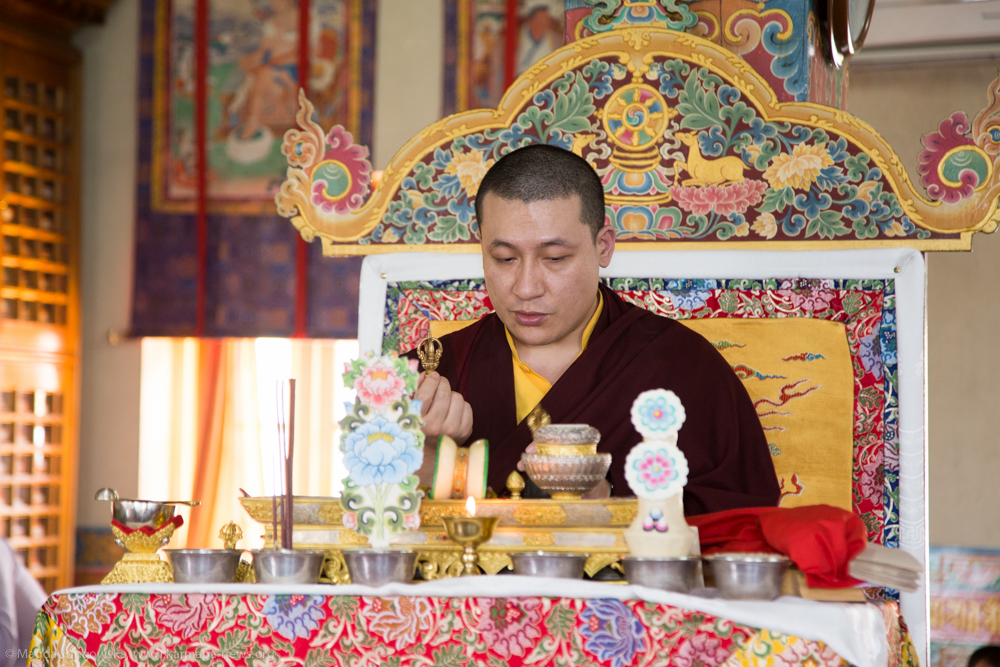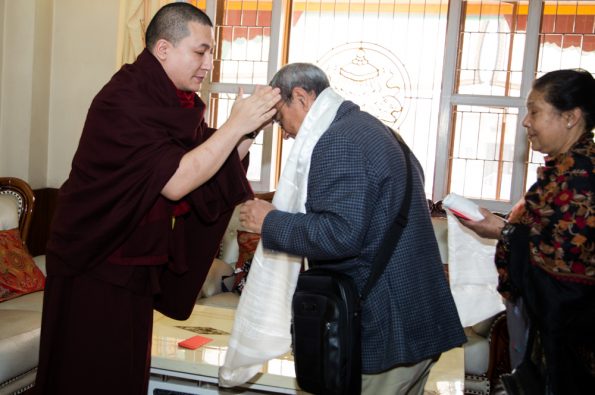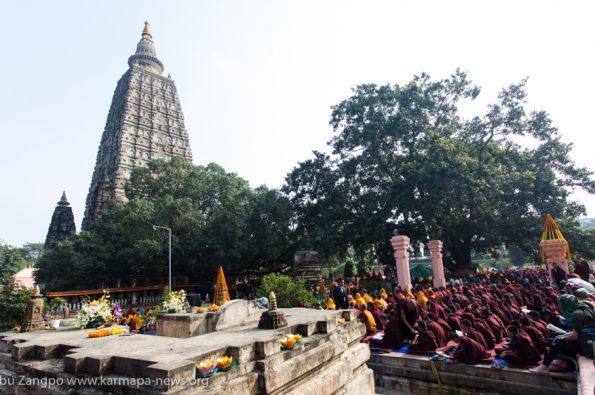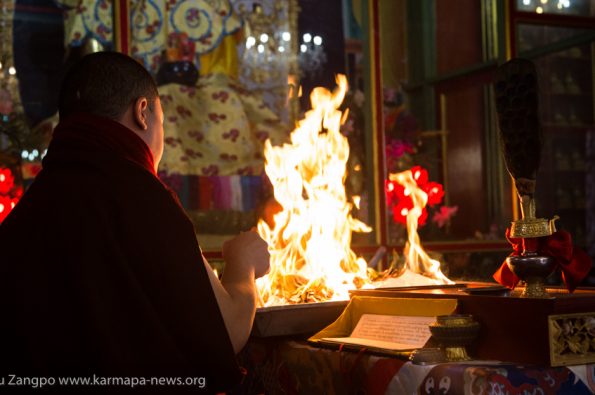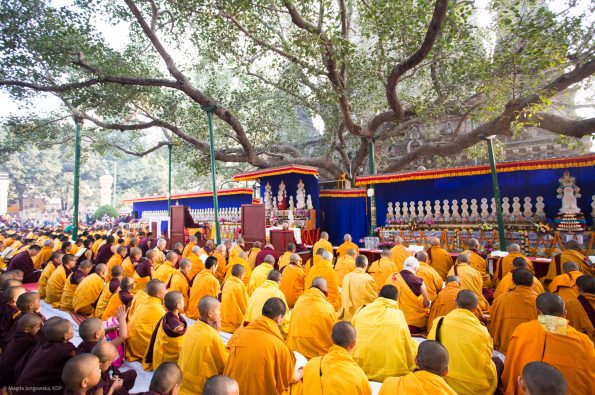Karmapa shares meditations for our times
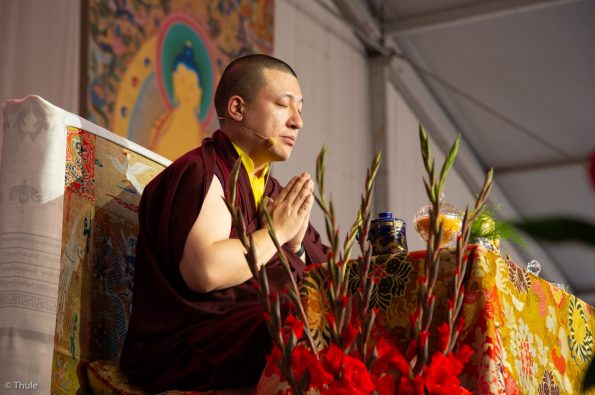
Thaye Dorje, His Holiness the 17th Gyalwa Karmapa, shares some meditations for our times, which he hopes will be a useful resource for practitioners and all others.
6 July 2020
Thaye Dorje, His Holiness the 17th Gyalwa Karmapa, invites us to wake up every day with a slight zest that today might be the day that we will wake up.
Rather than thinking it’s an endless Monday that we wake up to, wake up every day with a slight zest that today might be the day that we will wake up.
That’s why Buddhists celebrate birthdays or any other celebratory days at sunrise.
Of course, there isn’t anything wrong with celebrating at midnight.
Yawn and stretch like a baby.
Hum and buzz like a baby.
And rise to the possibility of waking up.
Sleep is a natural interval.
It’s a velvet death, not a stark death.
It’s a velvety interval that has the zest to wake life.
The sun comes down to tuck in a brilliant day.
Slumber away, like a baby.
Without caution or warning.
Isn’t it just marvellous that this stream of days and nights goes on and on, the same, indefinitely?
Is there anything to be frightened of in witnessing this stream?
I don’t think so.
One can wonder about the possibilities of how we will wake up, as each of us sleeps a little differently.
Tummy up, tummy down?
But that wondering is never frightening.
So do wonder, but don’t fear.
Close your eyes only to open them later.
The sun sets only to rise.
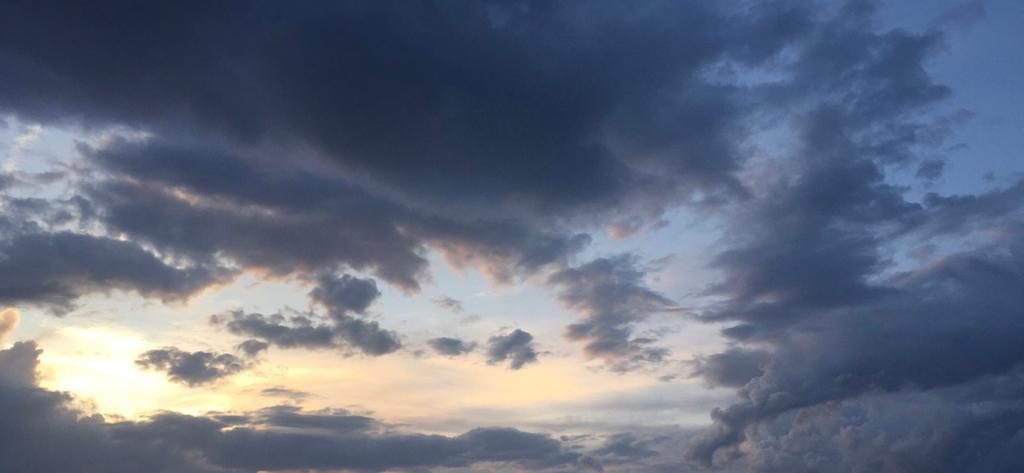
28 May 2020
Karmapa addresses the question of what life will be like after the pandemic.
That’s a question of the future, isn’t it?
Well, it is a mystery.
The future has always been a mystery. ‘Mystery’ not in the sense of foggy and unclear, but rather brightly uncertain in how it plays out.
In a cheerful sense, the future has always been a magical thing – an unknown thing that we have been trying to capture since time immemorial.
In a practical sense, there will be similar patterns of experience, such as mornings and evenings, sunrises and sunsets.
The predictable practical challenge will consist of basically struggling to capture our past memories, what we think was normal and nice.
That challenge has been repeated over and over so many times by now that it is not a mystery any more.
Hopefully we are somehow tired of that habit: the habit of seeking opportunities for our future to recapture the past days of the good times, like carrots being dangled in front of us, and yet they are attached to our back.
But if we want to do something different for a change (a new challenge is something we might perhaps enjoy, because a new challenge is always uplifting), then it might be interesting to see the future as an opportunity to let the past normality overwhelm the future a little less.
Of course, we need the compass of the ‘past’, but using that compass is the trick, rather than overusing or underusing it. If we master this trick, we needn’t be frightened to look at the future.
The complementary trick is the acceptance that there is no guarantee. We as humans have lived for as long as we can remember with concepts of guarantees of unimaginable proportions. But if we look at it calmly, not once did we really believe in these guarantees: in the end, when it came to going through hard times or making a decision in life, we didn’t really depend on laws and promises, because deep down we knew that no number of laws or promises would ever provide us with a real guarantee.
For the longest time we have lived with that contradiction: we feel comfortable with the promises, we are soothed by the concept that there is some kind of safety net, but at the same time we know that none of them have ever been fulfilled and that there is no absolute guarantee. And because we are humans, we cannot really change that fact – we cannot fix that. We only have to accept that that is the case.
Our anxiety comes from the non-acceptance of this state of uncertainty. But when we look at history, we see that ironically enough, it has kind of worked. We have somehow got by, and if we want to make the ride a smooth one, we have to accept the fact that there is always at least a 1% factor of uncertainty.
Our strange habit of holding on to the idea of a guarantee is deeply ingrained in us because we have lived with it for so long and because it is soothing to us. Maybe, this time round we can slightly alter this habit and get closer to our deep-down knowledge or hunch that rules and promises are fabricated; that cures of any kind may be 99% guaranteed, but a 1% factor of uncertainty always remains.
Without that small factor of uncertainty, life would be intolerable. It is that speck of uncertainty, of that 1 % of no guarantee that makes for the freshness of the present moment that presents us with healthy challenges and opportunities.
An acceptance of this dash of uncertainty lifts the present moment up and gives spice to our life.
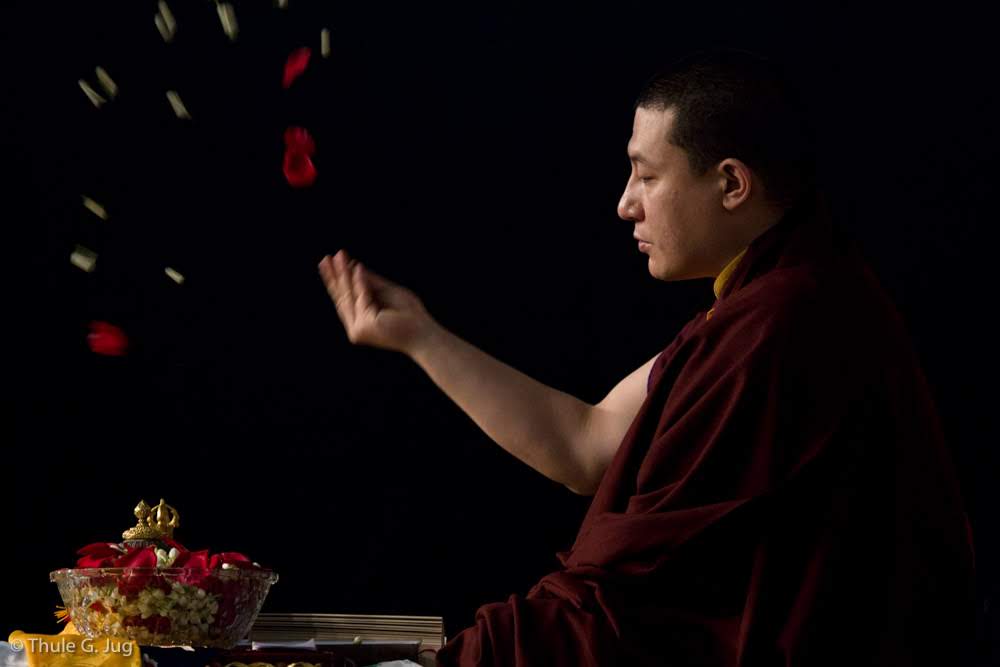
24 May 2020
Karmapa shares a meditation on the importance of not seeking a quick fix in the midst of change.
If we try to view this pandemic from a spiritual perspective and see spirituality as somehow separate from this ever-changing world, it will be very difficult to make sense or find a meaning.
No spiritual lens is required to see the obvious, and just how dangerous this disease is. Everyone can recognise it.
But somehow we are taken aback by it, gripped by it to a point that when we experience and witness countless cases and an ever-rising mortality rate, the arising of non-acceptance emotions compel us to look for meaning somewhere else, somewhere other than acceptance. That’s when spirituality somehow gets overused like suddenly following an extreme diet or going over the top with medications due to health reasons.
This approach tries to force spirituality to somehow fix the symptom in one go, which is sadly not possible. This kind of attempt, which sees spirituality as separate from health, casts out the healing benefit of spirituality.
This applies to all forms of spirituality I feel, and particularly to Buddhist spirituality.
Actually health is a fine line between feeling well and feeling unwell. Meaning those two are interdependent, or they rise and fall in a symbiotic way.
If we can see this then a composed approach will take place within us.
Taking care will take place together with letting go of trying to find a quick fix or finding an absolute cure.
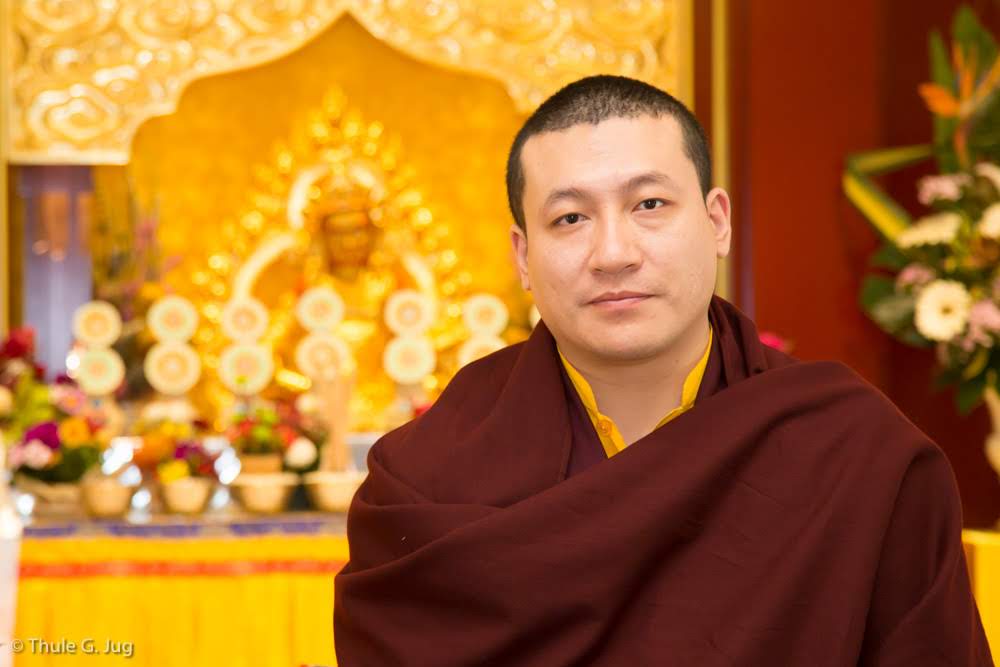
17 May 2020
Karmapa offers a meditation on concepts and human nature.
We don’t have to take on the burden of trying to predict the future.
The mysterious nature of the future can’t be grasped in any way.
The future will always remain in the future.
Therefore, we can only rely on predictions and take precautions.
It’s even meaningful to look into the future then.
To see that the future is uncertain and mysterious.
We then dare to look into it without any decision, meaning without worry.
This concept of the future is a mirror to the past.
Thinking of what has happened already stimulates wonder.
That’s the future.
Obviously our eyes and sensory doors can’t see the past or the future.
Only our conceptual mind can.
Time is a concept, and only a conceptual means can perceive concepts.
If we understand that, we can come to realise that concepts don’t really have much to do with reality.
Yet, daring to use concepts to look at reality can be seen as the most human thing to do.
What is human?
Is it this body?
Is this external and internal environment human?
Obviously not.
Humanness is a force of nature that desperately tries to relate to reality or life with concepts like time.
This attempt is neither good nor bad.
That’s just how humans are.
But if we view this human pattern in a caring way, we can find unimaginable beauty – humans are trying to do something that can never be done: we are trying to fix life by using concepts.
Picking up the courage to witness that – that is a spiritual practice.
So practice.
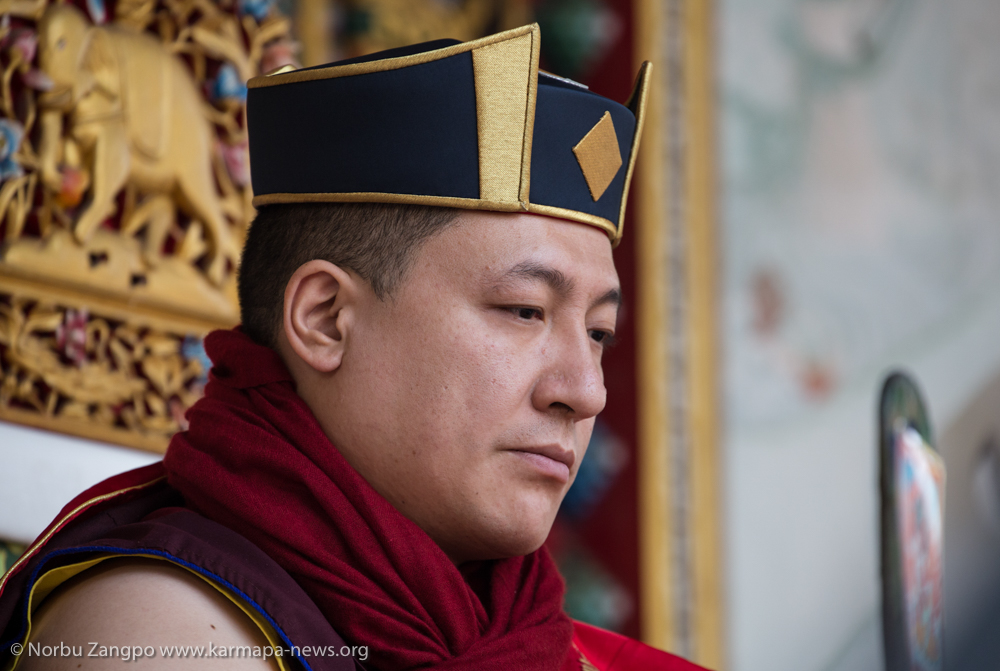
26 April 2020
In this latest meditation, Thaye Dorje, His Holiness the 17th Gyalwa Karmapa, explored the idea of ‘ordinary’ and ‘extraordinary’.
When we try to apply the Bodhisattvas’ methods, to think of others and benefit others, we might feel overwhelmed.
We might get the sense that we are too ordinary.
If we are ordinary, what is wrong with that?
Weren’t all Bodhisattvas in that position at one point? They must have felt utterly helpless and useless.
Nevertheless they achieved their extraordinary qualities – simply by accepting their ordinary state.
How did this happen?
First, they tried in ever so many ways to find this extraordinary state, just as Prince Siddhartha had done. But in the end, when all hopes had been dashed, they accepted their ordinary state.
They finally saw that aging is natural.
They finally saw that it’s also natural to get sick and to die.
It’s not at all wrong to experience age, sickness and death, no matter how ordinary they may seem.
Such experiences have taken place countless times.
These ordinary experiences have never stopped other experiences from happening.
It’s not as if these ordinary experiences are like a finale, cutting short any extraordinary experiences.
After all, this present experience is still possible.
So it is this simple acceptance, which stopped the quest to save everyone from dying and all of the other natural, ordinary experiences.
Instead, the quest to save everyone from dying transformed into the quest to help everyone embrace the acceptance of this ordinary pattern.
That’s how the Bodhisattvas became Bodhisattvas.
We too are in exactly the same position as the Bodhisattvas.
If we compare ourselves with the Bodhisattvas, we won’t find a single shred of difference.
So, let’s not burden ourselves with climbing a pinnacle-less mountain.
That’s no mountain at all.
When we climb mountains, we climb down.
That’s not inauspicious.
That’s most natural.
The descent of the mountain is essential to our enjoyment.
If there is such a thing as an advantage, then ours is that we can make use of the Bodhisattvas’ realisation that we do not need to look for a separate, extraordinary state.
Buddhahood is not separate from the ordinary state.
It was never meant to be.
If you superstitiously believe that the ordinary state is, in fact, ordinary, then consider this: pristine lotuses are born out of mud.
This is not just a saying.
It is a reality.
That is exactly how we are.
Ordinary-like compositions of physical and mental mud have produced a pristine experience like this one: Us. Or you. Or me. What’s wrong with this?
If there is anything wrong, it is our resistance to this natural way.
We can’t separate this pristine wisdom from this mud.
If we try, all we will get is either a lifeless statue or an idea of who we are.
That’s all we will get.
But it is that lifeless statue or idea that is the real death.
So this is not what we want. At least, if we are sane.
Therefore, my dear dharma friends, if you wish to benefit others, try to accept this ordinary state.
When I say ‘accept’, I do not mean in the sense of ‘take on this burden’ or ‘do nothing’!
Instead, accept it in a way that there is no other way.
There is no extraordinary way.
There never was.
We have that advantage.
We don’t have to try and flatten every mountain for the sake of all beings, in the name of finding this extraordinary way.
If there is an even path, we walk it.
If there is an uneven path, we walk it accordingly.
Our feet do not burden themselves that they have to walk the ground.
The ground does not burden the feet to walk on it.
There is just walking.
Nothing more, nothing less.
Extremely ordinary.
Yet, if viewed in a theatrical manner, it is extraordinary because we can’t find words to describe why these feet are walking the ground.
Left. Then right.
From beginning-less time.
Now that’s extraordinary.
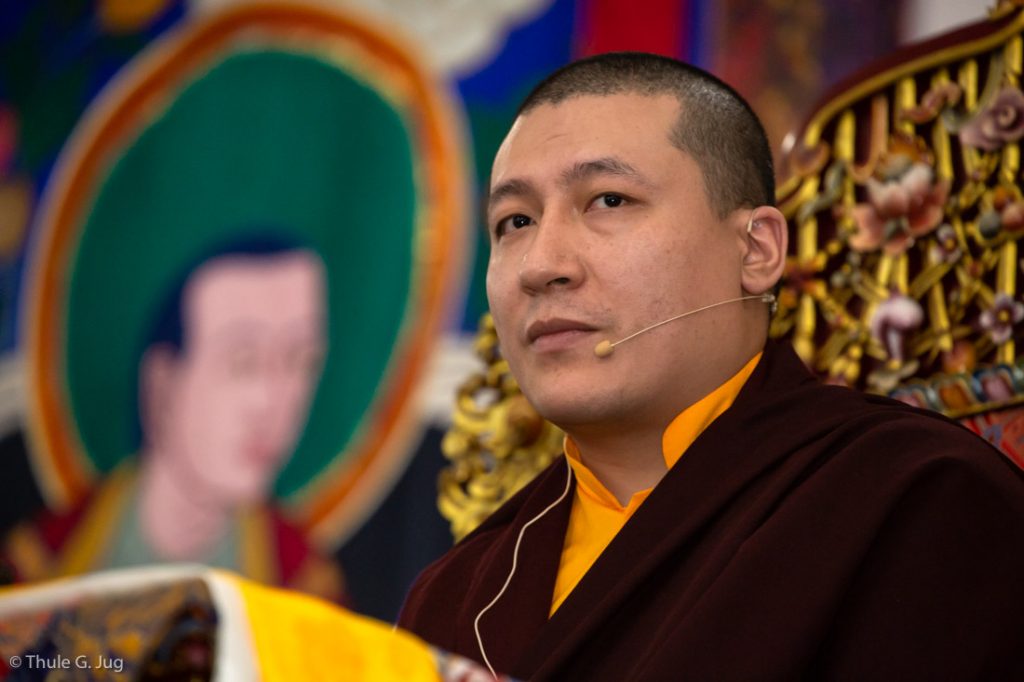
19 April 2020
Accepting change: Thaye Dorje, His Holiness the 17th Gyalwa Karmapa, shares a meditation on this subject
I’m not trying to frighten ourselves.
But we should practice with the attitude that it’s essentially a way to realise that we can’t overcome change, meaning that we are not an entity other than change or separate from change.
We are change.
So it’s a skilful way, and equally a caring way, to realise that.
We can try and think that everything is fatalistic, or that we have to be stoic and there is nothing we can do about it and let it be, so to speak.
But that will only numb our senses for a while and eventually bring panic.
So, practicing has a kind of charm to ease us into accepting change, without alarming us too much.
Owning our own karma is not based on clinging to the method of causality and rebirth.
These methods are just to roughly find a cue to flow with the current of change – just like waiting for a traffic signal before entering the highway.
Once we have entered into the traffic we naturally feel still.
That’s the point.
A disease like this is never evil.
It never was.
It’s just nothing in its essence.
But if we have courage this nothing can be transformed into something.
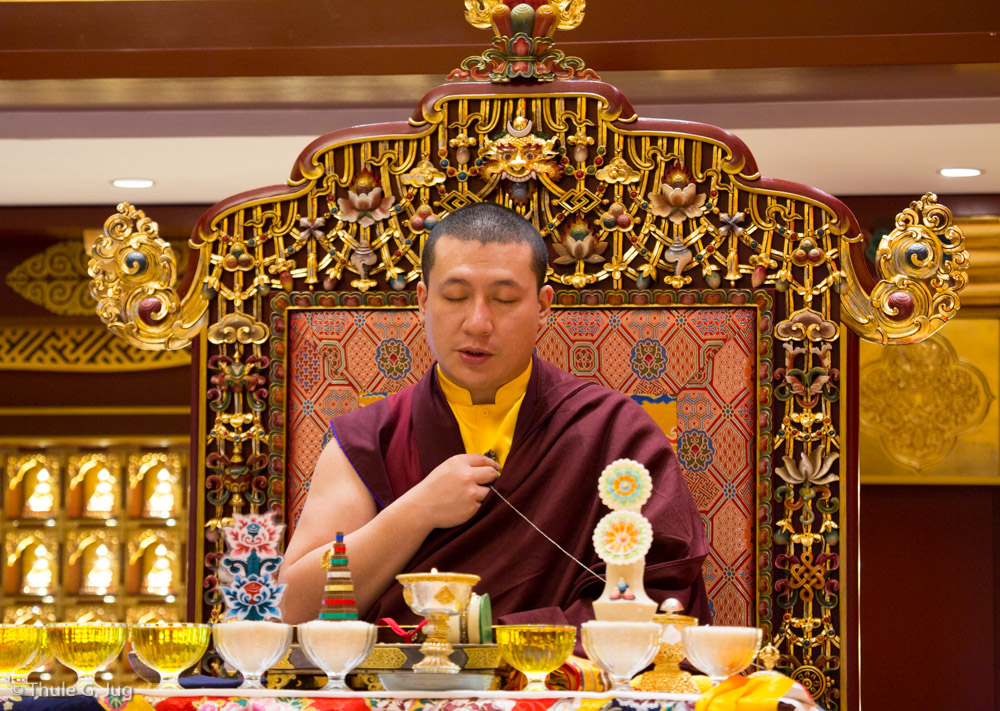
9 April 2020
Thaye Dorje, His Holiness the 17th Gyalwa Karmapa, offers this meditation on the importance of practice to accept change
Thaye Dorje, His Holiness the 17th Gyalwa Karmapa, presides over a fire puja at His Eminence Beru Khyentse Rinpoche’s guest house, India, December 2019. Photo / Tokpa KorloI’m not trying to frighten ourselves.
But we should practice with the attitude that it’s essentially a way to realise that we can’t overcome change, meaning that we are not an entity other than change or separate from change.
We are change.
So it’s a skilful way, and equally a caring way, to realise that.
We can try and think that everything is fatalistic, or that we have to be stoic and there is nothing we can do about it and let it be, so to speak.
But that will only numb our senses for a while and eventually bring panic.
So, practicing has a kind of charm to ease us into accepting change, without alarming us too much.
Owning our own karma is not based on clinging to the method of causality and rebirth.
These methods are just to roughly find a cue to flow with the current of change – just like waiting for a traffic signal before entering the highway.
Once we have entered into the traffic we naturally feel still.
That’s the point.
A disease like this is never evil.
It never was.
It’s just nothing in its essence.
But if we have courage this nothing can be transformed into something.
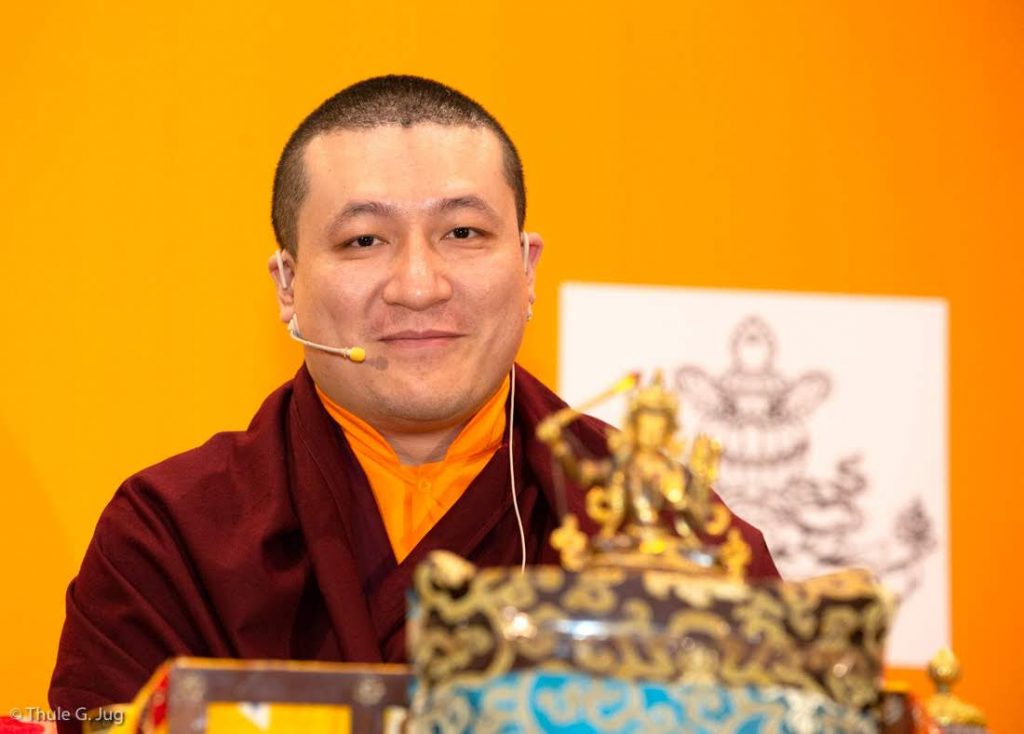
2 April 2020
A meditation on karma and change by Thaye Dorje, His Holiness the 17th Gyalwa Karmapa
Owning your own karma, by saying ‘it’s your own doing,’ is simply one way of talking about karma.
The concepts of time, self and language used in ‘it’s your own doing’ play a powerful part in describing karma. In fact, with the tools we have, we have no other way but to describe it in this way. It is as though there was an ‘I’ that caused something in the past to result in this present experience, in a linear way. But that’s just a way of explaining it – nothing more.
It is helpful on a relative level because I feel that this experience that I am going through is so vivid, and I want to be able to make sense of it. And so, this statement is almost the only way to put it into words.
However, if we strip away the concept of time for a moment, then what is left is just the causal aspect of karma, in which the past does not play any part. Then, we will find that, when owning our karma, the infinite burden of time is not weighing us down.
Next, we strip away the concept of ‘I’, or in this case ‘your’ and ‘it’s’, and then what is left of the statement is ‘own doing’. Since factors of subject and object are stripped away, the concept of ‘own’ has no place, and then just ‘doing’ will be left.
After a while ‘doing’ will become a mere sound – ‘Doing!’ Nothing more. Then there is even less burden – in fact there is no burden at all. There is not even a ‘here’ or ‘now’, both of which belong to the concept of time.
Nevertheless, the concepts of time, self, and all of the linguistic tools used have all played their part in their own way. They have not claimed any merit for their part and have departed naturally after conveying an answer to our question about how we can make sense of what we feel.
Ever since the time of Buddha Shakyamuni, all educational institutes or Viharas have been founded with the sole purpose and with the sole hope of making the knowledge of understanding karma (which is synonymous with change) available to all.
The establishment of these spiritual environments was never about anything else. It was never about escaping karma or change. The nature of enlightenment or liberation was presented simply as a means to inspire us to own change, to own karma.
Achieving Nirvana is never a separate entity from change.
Enlightenment is the complete acceptance of change.
With this attitude, practice as well as you can.
If it helps to think that you are practicing for all, then do just that.
But there is no need to practice with a sense of a burden.
All you need to do is just use these means to accept change.’
28 March 2020
A meditation from Thaye Dorje, His Holiness the 17th Gyalwa Karmapa:
Thaye Dorje, His Holiness the 17th Gyalwa Karmapa
A recitation of the Six Syllables is like a few simple lines of musical notes, or a melodic ringtone.
More elaborate practices are like complete orchestral scores, such as those created by Studio Ghibli.
Music doesn’t carry any real purpose, and it’s the same for meditational practices.
But, amid fear and anxiety, meditation can help us to find calm and gain focus.
So, kindly practice.
Even taking precautions is also a practice.
But practice that too like playing music.
26 March 2020
Thaye Dorje, His Holiness the 17th Gyalwa Karmapa, shares the following meditation:
Thaye Dorje, His Holiness the 17th Gyalwa Karmapa
As we breathe, if we say that inhaling is life, then as we inhale we are doing just that.
As we breathe, if we say that exhaling is death, then as we exhale we are doing just that.
But just because exhaling is death, it doesn’t mean that we should stop exhaling.
That act of panic itself would be unnatural.
As we breathe out and let go of life, it comes back.
Death might seem final, but just as there are long inhalations, there are long exhalations, and there is nothing else.
Both the aspects of breathing are interdependent.
They always were.
So there is nothing permanent.
Our natural body and mind knows this without any external input.
That’s how our heroes, the doctors and nurses, and the whole medical establishment, are able to care for all the patients.
Sure, they have fear and panic: they are sane.
But when they find a way to accept reality – which is change – their courage and their love take over their panic and fear, and with only one focus they go with the flow of what’s happening to the patients and do what they can.
So kindly breathe, my dear ones.
Breathe.
Breathe without fear.
You are breathing with me and I am breathing with you.


